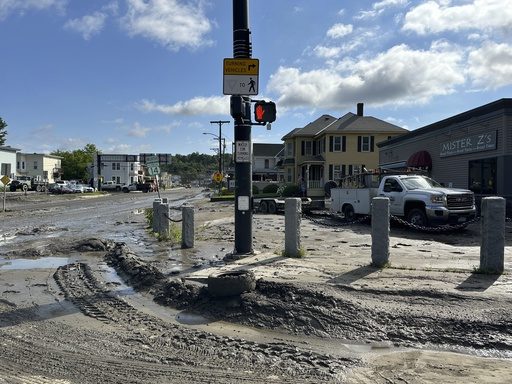PLAINFIELD, Vt. (AP) — The remnants of Hurricane Beryl dumped heavy rain on Vermont, causing flooding that washed away an apartment building, knocked out bridges and cut off towns, and retraumatized a state still recovering from catastrophic flooding that hit a year ago to the day. At least one person died.
Roads were flooded, washed out or covered with debris after heavy rain that started Wednesday and persisted into Thursday. Rescues continued late into the night, and some communities were under evacuation orders.
In Plainfield, residents of a six-unit apartment building had only 15 minutes to evacuate before the entire structure was swept away by floodwaters that also took out at least seven bridges and left many roads impassable and people stranded, said town Emergency Management Director Michael Billingsley. One car was swept away, but the occupant escaped, he said.
“It’s not lost on any of us the irony of the flood falling on the one-year anniversary to the day when many towns were hit last year. I know that only adds to the emotion many are feeling this morning,” Gov. Phil Scott told reporters Thursday, adding that the state’s “response and tools are only stronger” as a result of the tragedy a year ago.
The death came in the community of Peacham, officials said.
Public Safety Commissioner Jennifer Morrison urged people to continue to take precautions and stay out of the water, even as temperatures rise and make it temping to take a dip. “Regardless of river levels, our waterways are not safe right now. Currents are fast and there is a tremendous amount of flood debris in the water,” she said.
The deluge dropped more than 6 inches (15 centimeters) of rain on parts of Vermont, and the heaviest rainfall was in areas hit hard a year ago, said Marlon Verasamy, of the National Weather Service in Burlington. But the damage was not as widespread across the entire state as it was a year ago, he said.
Hilary Conant, who fled her second-floor Plainfield apartment, said she also had to flee rising waters a year ago.
“The water was coming up, so I knew it was time to leave with my dog. It’s very retraumatizing,” she said. A neighbor offered a camper to temporarily house her.
Art Edelstein assessed the destruction Thursday morning around a home he has owned for 50 years and now rents to tenants.
“I don’t even know how much water came from where because it’s just mud everywhere,” he said. “This is, in my impression, catastrophic. I’ve just never seen anything like this.”
In the small community of Moretown, the damage appeared worse than it was a year ago, and the school was among buildings once again damaged by floodwaters, said Tom Martin, chair of the town board. Workers hoped to install a temporary bridge Thursday on the main artery that provides access to the community, he said.
“They say we’re Vermont strong. We’ll get through it,” said Martin, his voice full of emotion.
Flash flooding also closed roads in several northern New Hampshire communities, including Monroe, Dalton, Lancaster and Littleton, where officials said 20 people were temporarily stranded at a Walmart store and crews made water rescues.
Two tornadoes were confirmed Wednesday in western New York. Some areas in the northern part of the state got 4 inches (10 centimeters) or more of rain, causing water to rush down streets in the village of Lowville.
Parts of northern New York and New England, including Vermont, remained under flood watches or warnings early Thursday. Thunderstorms associated with Beryl were forecast for much of the East Coast through Friday, the National Weather Service said.
Vermont emergency managers had urged residents Wednesday to seek higher ground if floodwaters approached and said rescue teams and the National Guard were at the ready.
Even though Vermont is not a coastal state, it nonetheless has experience with tropical weather. Tropical Storm Irene dumped 11 inches (28 centimeters) of rain on parts of Vermont in 24 hours in 2011. The storm killed six in the state, washed homes off their foundations, and damaged or destroyed more than 200 bridges and 500 miles of highway.
In May, Vermont became the first state to enact a law requiring fossil fuel companies to pay a share of the damage caused by extreme weather fueled by climate change.
Republican Gov. Phil Scott allowed the bill to become law without his signature, saying he was concerned about the costs of a grueling legal fight. But he acknowledged that he understands something has to be done to address the toll of climate change.
Beryl landed in Texas on Monday as a Category 1 hurricane and left millions in the Houston area without power. It then carved a path across the interior U.S. as a post-tropical cyclone that brought flooding and sometimes tornadoes from the Great Lakes to Canada and northern New England.
Beryl has been blamed for at least seven U.S. deaths — one in Louisiana and six in Texas — and at least 11 in the Caribbean. More than 1.3 million homes and businesses in Texas still lacked electricity early Thursday, down from a peak of over 2.7 million on Monday, according to PowerOutage.us.
The storm has caused at least $3.3 billion in damage in the United States, Mexico and the Caribbean, according to Karen Clark & Co., a Boston-based firm that works with insurance companies to estimate disaster costs.
It calculated a flash estimate Thursday of $2.7 billion in privately insured U.S. losses, along with $510 million in the Caribbean and $90 million in Mexico. The estimate is only for insured properties and does not include homes covered by the U.S. National Flood Insurance Program, so total losses will be higher.
___
Associated Press writers David Sharp in Maine, Holly Ramer in New Hampshire and Seth Borenstein in Washington contributed to this report.
Source: post





